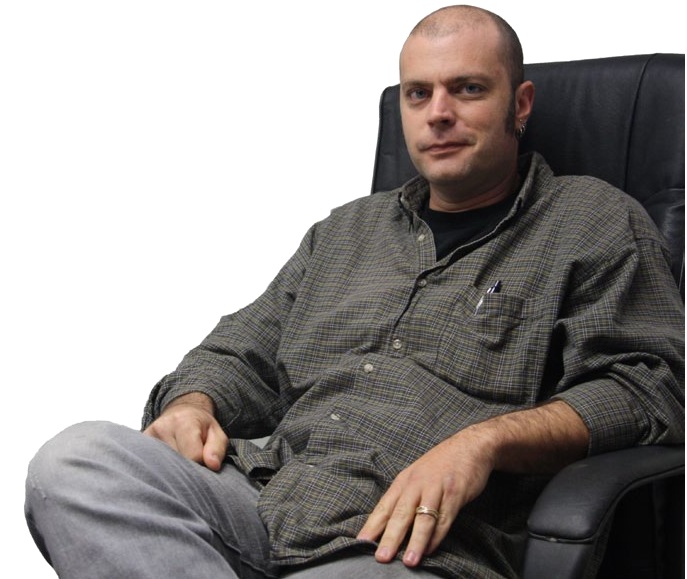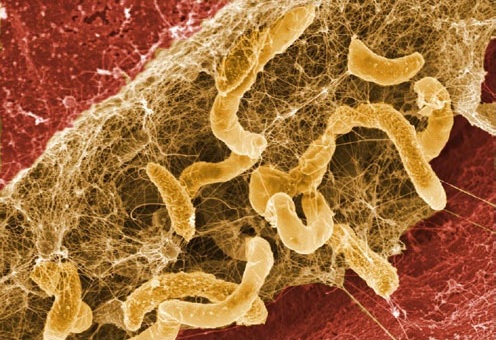Nick Cogan

Being a biomathematician means confronting new fields of study every day and reaching beyond the limits of one's own discipline. The application of math to any and all aspects of the organic world means just about anything could come up. In short - it's an ever changing world, not for those afraid of the unfamiliar.
But for FSU's Nick Cogan, trudging off into unknown territory is just another day at the office. He came to biomath early, back in his days as an undergraduate at Texas Tech. While preparing to write his senior thesis, he came into contact with someone who was working on a problem for a forensic scientist trying to establish time of death for corpses without using body temperature.
He got so mad that I didn't know any biology. He would sit down with me at lunch and he would say, 'okay, here's a cell,' and start drawing a picture. Nick Cogan
It was a morbid entry into the field, perhaps, but it got Cogan thinking about the ways mathematics could converse with other disciplines and ended up having a big influence on his thesis and the rest of his career.
While pursuing his master's at the University of Montana, Cogan got the change to expand that conversation even more by working at the Center for Biofilm Engineering, an interdisciplinary National Science Foundation center that brought together faculty from different departments and funded grad students to work with them. The only hitch? He hadn't studied biology since high school, which didn't bother him but did manage to annoy the microbiologist he was paired with.
"He got so mad that I didn't know any biology," says Cogan. "He would sit down with me at lunch and he would say, 'okay, here's a cell,' and start drawing a picture."
He managed to make it through and pick up on what he'd missed. Before long, he and his wife, Keely, who he married right after undergrad, were off to the University of Utah, where Cogan got his Ph.D., then to postdocs at Tulane in New Orleans and Rice in Houston before eventually landing at FSU in January of 2006. It was the fulfillment of a steadfast, if vague, dream he'd had since childhood.
"I think when I was in fifth grade I had a meeting with one of the guidance counselors and said, 'I'm going to get a Ph.D. I had no idea what I was talking about, but that was the plan," Cogan says.
The vagueness of that early ambition may have been a signal that he was perfectly cut out for the flexibility required in biomath. Since finishing his Ph.D., he has helped researchers in several far-flung fields solve real world problems.
He has done disinfection studies, testing the effectiveness of disinfectants, antibiotics, and biocides by using math to calculate the persistence of bacteria over time as well as space.
He has studied biofilms - bacteria that grow on surfaces and impact many different industries like shipbuilding, where biofilm on a ship's hull can greatly decrease its efficiency in the water.

A microscopic image of a biofilm. Cogan studies films like these in many different contexts. Photo courtesy of the Pacific Northwest National Laboratory
Recently, Cogan's work has focused on plant life and how to find new ways to keep biofilms from developing on crops, particularly grapevines. California winemakers are unwilling to compromise the quality of their grapes by using antibiotics, and are often forced to rip out whole sections of their vineyards to prevent the spread of diseases like Pierce's disease, which can devastate a harvest. Cogan is working on ways to insert different metals into the plants that can kill the biofilm.
That much variation in focus might be enough to drive some people crazy, but Cogan welcomes the challenges biomath offers and the variation it brings to his study as well as to his teaching. He serves on a number of committees and is currently directing five graduate students, each with a unique and unexpected topic to work on.
"All of them have chosen some really interesting problems," he says. "It's weird, because you're trained to do a lot of things, but you're not really trained to mentor Ph.D. students, so you try to figure out the best way for each student. They've all settled on problems that I never would have chosen myself."
In his five years in Tallahassee, he's finally had time to settle in after so much time spent bouncing from place to place, and has gotten to know lots of FSU students and become comfortable in his teaching role, a far cry from what he remembers of his first experience in front of a classroom, which he describes as "terrifying."
Cogan and his wife have also managed to let their kids settle down - they have a son and two daughters - though they seem to have the same penchant for wandering that Cogan displays in his academic pursuits. After the family recently went to Cincinnati for six month while he was on fellowship, the kids were ready for life on the road.
"When we came back, they were like, 'okay, where are we going to go next?' They want to go to Europe. I'm supposed to get a sabbatical and go to Greece or something."
Fortunately for Cogan, a career in biomath means that there's work to be done anywhere that organic matter exists, so the entire world is, literally, teeming with new opportunities.
A microscopic image of a biofilm. Cogan studies films like these in many different contexts. Photo courtesy of the Pacific Northwest National Laboratory
